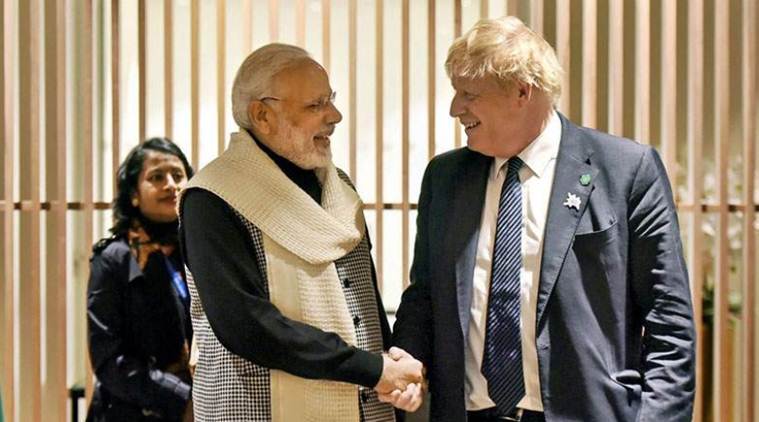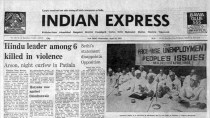- India
- International
Raja Mandala: Looking beyond the diaspora
India must avoid making Pakistan a preoccupation in relationship with UK. It must take advantage of shift in Britain’s international orientation.
 Prime Minister Narendra Modi with his English counterpart Boris Johnson. (Photo| PTI/File)
Prime Minister Narendra Modi with his English counterpart Boris Johnson. (Photo| PTI/File)
Delhi is surely relieved that Jeremy Corbyn did not win the recent general elections in the United Kingdom. The Labour Party’s hostility towards India on the question of Kashmir, and its political tilt towards Pakistan under Corbyn, galvanised a large section of the Indian diaspora to rally behind the Tories. While Delhi welcomes the return of Boris Johnson as Prime Minister of Britain, it knows that there is much distance to cover before problems with London on Kashmir and Pakistan are overcome.
At its annual conference in Brighton in September, the Labour Party had approved a resolution criticising India’s decision to change the constitutional position of Kashmir, expressing support for the Kashmiri “right to self-determination” and calling for “international intervention” and “mediation” between Delhi and Islamabad. South Block reacted sharply to the resolution and the High Commission in London conveyed its dismay and disapproval to India’s friends in the Labour Party.
As Labour’s unhelpful tone carried over to the Party’s election manifesto that followed a few weeks later, Delhi knew that dealing with a Labour government, whose return to power seemed a serious possibility then, would be a major headache. Meanwhile, nearly 130 Indian community organisations in Britain sent strong messages of protests to the Labour Party, and as the elections approached, the diaspora seemed ready to shed its traditional preference for Labour.
Boris Johnson, who was locked in a do-or-die political battle, grabbed the opportunity to tap into the Indian diaspora’s resentment against Labour. He devoted some quality time for a temple-run during the campaign to reassure the Indian diaspora that the Conservative government will be mindful of its concerns.
Whether or not the Indian diaspora made a decisive difference to the overall electoral outcome in favour of Johnson, there is no doubt that Labour’s Kashmir policy helped unite the Indian community in Britain. At nearly 1.4 million, the Indian diaspora in Britain is one of the largest and its contributions to civic life — economic, political and social — have steadily grown over the decades. But, it is only now that it is emerging as an assertive force.

While the Indian diaspora might have tasted the first political fruits of its assertion, and though Delhi is pleased at the outcome of the election, the problem of British involvement in Kashmir and other India-Pakistan issues is unlikely to disappear any time soon. Three problems stand out.
First, whether it wants or not, India is being sucked into an unfortunate competition with Pakistan in diaspora mobilisation in the United Kingdom and beyond. This is not very different from the recent developments in the US, where Pakistan has stepped up the effort to direct its diaspora against India’s Kashmir policy. Pakistan may have every reason to extend and deepen its sphere of contestation with India into the domestic politics of the Anglo-Saxon world, where the South Asian diaspora is in large numbers, and more broadly in the West. While Delhi needs to fend off Pakistan’s tactics, it should avoid the danger of turning this competition with Pakistan as the central preoccupation in dealing with the West and its domestic opinion.
Second, while the Indian diaspora outnumbers the Pakistani diaspora, Delhi may find it increasingly hard to cope with the larger alliances that are beginning to coalesce and question India’s current domestic policies. The new coalitions bind the Pakistani diaspora with the broader communities of Muslim organisations and human rights groups. Delhi will also need to reassure a lot of friendly constituencies in the West that are concerned about the nature of recent developments in India.
Third, and more specifically, India has dealt with the British problem on the Kashmir question for decades now under different governments, both Labour and Conservative. It generally had bigger problems with Labour governments. One might recall, in the first term of Prime Minister Tony Blair, Foreign Secretary Robin Cook’s interventionist policy on Kashmir wrecked Queen Elizabeth’s visit to India in 1997 to celebrate the 50th anniversary of Independence. Conservative prime ministers before Johnson, most notably David Cameron, sought to move Britain decisively away from Labour’s tilt towards Pakistan on Kashmir. But it has been a lot harder to change the attitudes of the British establishment or the “deep state”.
It is useful to remember that Delhi’s most recent political spat with London was under the Conservative government of Boris Johnson. It was over the British role in the United Nations Security Council discussions that followed Delhi’s decision to alter the constitutional status of Jammu and Kashmir in August. The scrap certainly ended in Delhi’s favour, but the structural problem certainly endures.
Delhi must surely pay attention to and manage the tactical shifts in the British establishment’s attitude to Kashmir and other bilateral issues between Delhi and Islamabad. It must also recognise, however, that Britain, like so many other countries, has its own interests in Pakistan and faces pressures to respond to them.
In the end, mobilising the diaspora can only be a small part of India’s strategy in getting Britain to change its approach towards its issues with Pakistan. If India’s economy is nearly 10 times larger than that of Pakistan and there is a much larger swathe of shared interests between Delhi and London, then there surely are other ways of persuading the British establishment to rethink its stance on India.
To get there, Delhi must now focus on the new possibilities with Britain presented by Boris Johnson’s victory. For Delhi, this can’t be about a tactical play on Kashmir with Britain; nor should it be about Boris Johnson’s personal commitment to improving relations with India. For India, the question is about taking full advantage of the historic shift in Britain’s international orientation — economic and political — that is about to unfold.
The writer is director, Institute of South Asian Studies, National University of Singapore and contributing editor on international affairs for The Indian Express
40 Years Ago
EXPRESS OPINION
Apr 18: Latest News
- 01
- 02
- 03
- 04
- 05









































